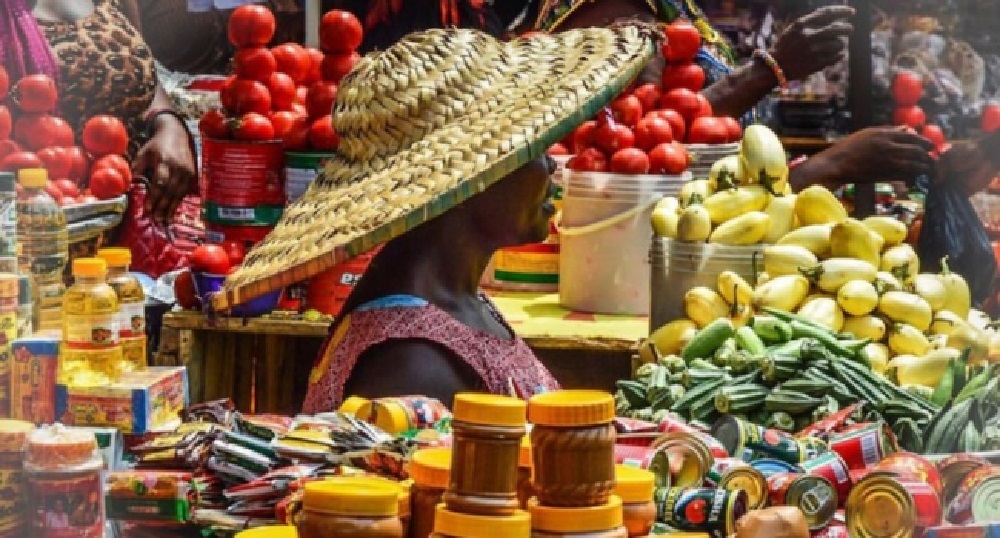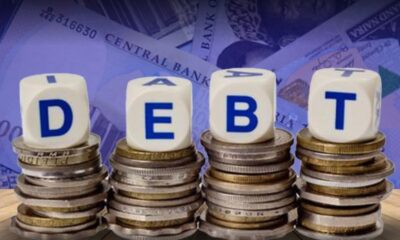Economy
Asian, European stocks plunge after US jobs report

By Francesca Hangeior
Asian and European markets sank Monday after an outsized US jobs report dealt another blow to hopes for more interest rate cuts, while oil extended a rally sparked by new sanctions on Russia’s energy sector.
The equity sell-off tracked hefty losses on Wall Street, where all three main indexes finished more than one per cent lower as the new trading year continued to falter.
Keenly awaited data on Friday showed the US economy created 256,000 jobs last month, a jump from November’s revised 212,000 and smashing forecasts of 150,000-160,000.
The figures followed news that the crucial US services sector picked up in December, with the prices component soaring more than expected to the highest level since last January, while another report showed job openings hit a six-month high in November.
Hopes that the Federal Reserve will continue cutting rates through 2025 — having made three trims last year — were dashed when in December it indicated just two reductions over the next 12 months, down from four tipped previously.
The hawkish pivot came as inflation continues to hover above the bank’s two percent target, while there are also concerns that president-elect Donald Trump’s plans to slash taxes, regulations and immigration will reignite prices.
“Given a resilient labour market, we now think the Fed cutting cycle is over,” said Bank of America’s Aditya Bhave and other economists.
“Inflation is stuck above target: in the December (summary of economic projections), the Fed not only marked up its base case for 2025 significantly, but also indicated that inflation risks were skewed to the upside. Economic activity is robust.
“We see little reason for additional easing.”
Markets in Sydney, Singapore, Seoul, Mumbai, Taipei, Manila, Bangkok and Jakarta all sank. Tokyo was closed for a holiday.
Hong Kong and Shanghai also fell but pared initial losses as data showed Chinese exports and imports topped forecasts in December.
London, Paris and Frankfurt fell at the open.
On currency markets the pound was wallowing around lows not seen since the end of 2023 owing to fading hopes for US rate cuts as well as worries about the British economy. The euro struggled at its weakest since November 2022.
Surging oil prices added to unease, with both main contracts jumping more than percent — extending Friday’s gains of more than three percent — after the United States and Britain announced new sanctions against Russia’s energy sector, including oil giant Gazprom Neft.
However, commentators do not expect prices to spike too much, even amid speculation that Trump will hit Iran with fresh sanctions.
“A significant and perhaps underpriced risk to crude oil prices is the potential for supply to outstrip demand, especially given OPEC+’s intention to reintroduce barrels to the market,” said Stephen Innes at SPI Asset Management.
“Even if US sanctions curtail Iranian oil production by 1.5 million barrels a day — a scenario similar to that during Trump’s previous presidency — this amount could easily be compensated by OPEC+, which is currently holding back 5.8 million barrels a day, or 5.3 percent of the total global production capacity.”
However, he added that some issues could lead crude to rocket, including an escalation of the Middle East crisis, a significant reduction in Russian output or exports and a strategic about-face by OPEC+ to slash production.
Economy
Volvo announces termination of 800 U.S. workers, cites tariff, market decline

Volvo Group has announced plans to lay off up to 800 workers at three of its U.S. facilities over the next three months, citing ongoing market uncertainty and declining demand exacerbated by tariffs introduced under the administration of President Donald Trump.
The affected locations include the Mack Trucks plant in Macungie, Pennsylvania, as well as Volvo Group sites in Dublin, Virginia, and Hagerstown, Maryland.
In a statement on Friday, Volvo Group North America confirmed that between 550 and 800 employees would be impacted.
The company, a subsidiary of Sweden’s AB Volvo, employs nearly 20,000 people across North America.
The layoffs come amid wider turmoil in the automotive and manufacturing sectors, as shifting U.S. trade policy and a series of tariffs continue to drive up production costs. Economists have pointed to the uncertainty surrounding Trump’s trade strategy as a factor undermining both business and consumer confidence, with concerns mounting over a potential economic slowdown or recession.
According to Volvo, the company is grappling with a decline in heavy-duty truck orders, driven by instability in freight rates, anticipated regulatory changes, and the growing financial burden of tariffs. “We regret having to take this action, but we need to align production with reduced demand for our vehicles,” a company spokesperson stated in an email quoted by Reuters.
Volvo’s announcement marks another blow to an industry already navigating a complex web of supply chain challenges and fluctuating market conditions, with other manufacturers also warning of potential cost hikes and disruptions tied to global trade disputes.
Economy
Inflation surged to 24.23% due to escalating cost of living

Inflationary pressure has reappeared as Nigerians grapple with increases in average costs of basic food items and energy.
For the first time after the rebasing of the Consumer Price Index (CPI), headline inflation spiked in March to 24.23 per cent – 105 basis points above the 23.18 per cent recorded in the previous month.
The National Bureau of Statistics (NBS) yesterday indicated that the rate of increase in the average price level was higher in March than the level in February.
In January, the NBS updated the weight and price reference periods in calculation of the CPI to make the inflationary gauge more reflective of changes in consumption patterns and the economy generally.
The rebasing did not only brought the base year closer to the current period from 2009 to 2024, it also introduced some critical methodology changes to improve the computation processes.
After the rebasing, inflation dropped from 34.80 per cent in the pre-rebased period of December 2024 to 24.48 per cent in January 2025. It dropped further to 23.18 per cent in February.
In its latest report, NBS recorded 186 basis points changes between the monthly inflation rate, with the month-on-month rate rising from 2.04 per cent in February to 3.90 per cent in March.
The NBS attributed the spike to the rise in costs of food and alcoholic beverages, fuels and electricity, among other items.
Analysts at CardinalStone said the resurgence was due to renewed foreign exchange (forex) pressures amid heightened global risk-off sentiment.
They pointed at foreign portfolio investments (FPIs) outflows and increased dollar demand, which saw naira dropping by 2.4 per cent in March.
Experts also cited increase in price of Premium Motor Spirit (PMS) or petrol, following the temporary suspension of the naira-for-crude swap arrangement.
Food inflation rate stood at 21.79 per cent in March 2025. The composite food index decreased to 21.79 per cent from 23.51 per cent.
Core inflation, which excludes volatile agricultural produce prices and energy, rose to 24.43 per cent from 23.01 per cent.
Specifically, the month-on-month food inflation rose by 50 basis points from 1.67 per cent in February to 2.18 per cent in March.
The NBS attributed the increase in food inflation to increases in the average prices of basic food items including ginger, garri, broken rice, honey, crabs, potatoes, plantain flour, periwinkle and pepper amongst others.
On a state-by-state basis, food inflation was higher in Oyo with 34.41 per cent; Kaduna (31.14 per cent) and Kebbi (30.85 per cent).
On the other side, the 9.61 per cent recorded by Bayelsa; Adamawa (12.41 per cent) and Akwa Ibom (12.60 per cent), were the lowest inflation rates.
Analysts expressed concerns that the resurgent inflationary pressure might lead to renewed tightening stance by the Central Bank of Nigeria (CBN).
CBN Governor Dr. Olayemi Cardoso, had at the end of the first Monetary Policy Committee (MPC) meeting in 2025, reiterated the apex bank’s commitment to orthodox monetary policies, noting that the apex bank’s stance will be reflective of the inflationary trend.
With inflation rate dropping in February, the MPC had decided to maintain all key monetary policy parameters, including the Monetary Policy Rate (MPR) at 27.50 per cent, the asymmetric corridor around the MPR at +500/-100 basis points, the Cash Reserve Ratio (CRR) at 50.00 per cent for Deposit Money Banks and 16.00 per cent for Merchant Banks, and the Liquidity Ratio at 30.00 per cent.
Clarifying the impact of the rebased CPI, Cardoso had explained that the lower inflation figure should not be misinterpreted.
He underlined the need to analyse more data before drawing comparisons, noting that the CBN is currently assessing the figures and will provide further guidance in due course.
The CBN boss stressed the critical importance of collaboration between monetary and fiscal authorities in sustaining recent economic improvements.
Addressing concerns about the impact of elevated borrowing costs on economic growth, the CBN governor assured that the apex bank’s primary objective is to stabilize the foreign exchange and financial markets.
He expressed confidence that such stability would attract increased foreign investments, stimulating the much-needed economic growth.
Cardoso also highlighted the competitiveness of the Nigerian currency, which has spurred growing interest from international investors.
Economy
SEE Current Black Market Dollar (USD) To Naira (NGN) Exchange Rate

The exchange rate between the US dollar and the Nigerian naira continues to draw significant attention from individuals and businesses alike, especially those involved in international trade and remittances.
On Saturday, April 12, 2025, activity in the Lagos parallel market, commonly known as the black market shows that the buying rate for one US dollar stands at ₦1570, while the selling rate is ₦1575.
These figures are sourced from traders and Bureau De Change (BDC) operators who are active in key currency exchange hubs across Lagos.
Why the Black Market Rate Matters
Although the Central Bank of Nigeria (CBN) does not officially recognize or support the use of the black market for foreign exchange transactions, many Nigerians still rely on it due to difficulties in accessing forex through official banking channels. Issues such as limited availability, long processing times, and strict documentation requirements have made the black market a more accessible, albeit riskier, alternative.
CBN’s Official Position
The CBN continues to warn against participating in parallel market trading, stating that such activities undermine the stability of the national currency. The apex bank urges those in need of foreign currency to apply through authorized financial institutions, which are mandated to follow official exchange rates.
Nonetheless, the disparity between the official and unofficial markets persists, often influenced by market forces such as demand, inflation, and fluctuations in Nigeria’s foreign reserves.
Latest Exchange Rates Overview
Black Market (Parallel Market) Rate
Currency Pair Buying Rate Selling Rate
USD/NGN ₦1570 ₦1575
CBN Official Rate
Currency Pair Highest Rate Lowest Rate
USD/NGN ₦1630 ₦1570
Key Notes for Forex Users
The exchange rates in the black market often differ slightly from one location or dealer to another due to market volatility and negotiation margins.
Rates can also fluctuate within hours based on economic news, government policies, and global financial trends.
It is advisable to compare rates from multiple sources before conducting any large transactions, especially in volatile markets.
What This Means for Nigerians
The current forex rates reflect continued pressure on the naira, and many analysts believe that inflation, reduced oil revenue, and inconsistent monetary policies are key factors driving the demand for the dollar. For everyday Nigerians, this means the cost of imported goods remains high, and businesses dependent on international suppliers face growing challenges.
Until forex supply stabilizes through official channels, the black market will likely remain a major player in Nigeria’s currency landscape.
-

 News9 hours ago
News9 hours agoBREAKING! Pope Francis is dead
-

 News13 hours ago
News13 hours agoRetirees with outstanding loans may lose property – FG
-

 News6 hours ago
News6 hours agoUPDATED: How Pope Francis transited, last activity, health challenges, others
-

 News23 hours ago
News23 hours agoIsrael’s remote controlled bulldozers breaking ground in Gaza war
-

 News14 hours ago
News14 hours agoSad as hotelier slumps, dies at wife’s 60th birthday thanksgiving
-

 News23 hours ago
News23 hours ago70-hour Chess Marathon: Onakoya reportedly breaks record set by Norwegians
-

 Metro14 hours ago
Metro14 hours ago77-year-old Nigerian Uber driver shot dead in US, passenger in critical condition
-

 News9 hours ago
News9 hours agoFemi Ojudu: We Understand His Bitterness Being A Political Coupist– Lere Olayinka bombs Ojudu over comment on wike


















